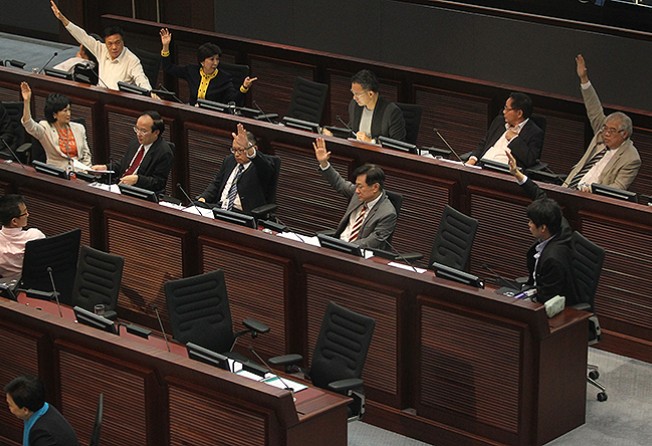Pro-government heavyweights lacking in political acumen
Albert Cheng says public-office holders, like DAB vice-chairwoman and the justice secretary, must be whiter than white in their conduct

People who hold public office wield influence in society in whatever they say or do. In today's Hong Kong, where our political system has failed to match the pace of public opinion, it's only natural that the behaviour of our politicians should come under the spotlight.
Two recent news items have highlighted the lack of political alertness among pro-government politicians.
In September, a City University team publicised the findings of its study of different brands of turtle jelly, which found that the samples from local herbal chain store Hoi Tin Tong contained very little or no turtle shell.
The company, whose sales have taken a beating after the City University report was publicised and an unrelated accusation surfaced that it had compromised food safety, hired a biotechnology company to conduct tests to prove that its jelly contained turtle. Announcing the results in October, it said the City University study was "not well-rounded".
Later that month, Hong Kong customs officials directed to examine the claim also reported that they had found turtle DNA in Hoi Tin Tong products.
This apparently was the reason Starry Lee Wai-king, a member of the legislative and executive councils, and a vice-chairwoman of the Democratic Alliance for the Betterment and Progress of Hong Kong, raised a question in Legco late last month, standing up for Hoi Tin Tong.
The problem is, the founder of Hoi Tin Tong, Ng Yiu-ming, is reported by the Chinese press to have supported DAB chairman Tam Yiu-chung in his election campaign last year. This raises uncomfortable questions about the relationship between business and politics.
During the Legco session, Lee, without naming either Hoi Tin Tong or City University, noted that in this case, a "certain university report" had adversely affected the business of a "certain company". She asked if there was anything the government could do to help compensate a company for business loss in such a case when the report turned out to be less than accurate.
Her questions could well be read as an attempt to interfere with academic research.
Food safety is a matter of public welfare. As a member of Legco and Exco, Lee must act as a gatekeeper to safeguard public interests. But here, she appears to be using her public authority to put pressure on an academic institution to suppress academic freedom.
She was not the only one. In late October, Liberal Party lawmaker Tommy Cheung Yu-yan, representing the catering sector, bought Hoi Tin Tong turtle jelly to show support for the company. He also questioned the motives of the university researchers and urged customs officials to take them to task for their "misleading" research.
Are these two legislators acting as Hoi Tin Tong representatives? Their actions have certainly raised a lot of questions.
In another example of an apparent lack of political awareness, Secretary for Justice Rimsky Yuen Kwok-keung went on a radio show recently to promote public consultation for political reform. The trouble is that the Commercial Radio programme in question was hosted by the station's chief executive, Stephen Chan Chi-wan.
Chan, a former TVB general manager, was recently acquitted of a bribery charge. But the Department of Justice has appealed and a retrial could be pending. By accepting an exclusive interview with Chan, Yuen has shown a disregard for the spirit of the law.
There are very clear lines in the legal sector guiding the relationships and communications between legal professionals, judges, defendants and witnesses. When a case is going through the legal process, stakeholders must avoid any kind of contact, either directly or indirectly.
D100, a radio station founded by me, asked about the appropriateness of Yuen's actions, and a spokesperson denied that judicial independence had been compromised. But his reasons were not convincing. First, he said, besides Chan, there were other hosts present during the interview. Second, the entire interview was conducted in an open manner and the interview was broadcast live in the presence of representatives of other media organisations.
Third, the interview was on political reform and had nothing to do with Chan's court case and Yuen appeared on the show as a member of the political reform consultation group, not as justice secretary. And, fourth, besides the radio interview, Yuen has had no personal contact with Chan.
The explanations are nonsensical because Yuen is justice secretary at all times and, as such, cannot be detached from his official role.
No matter what, both Yuen and Lee have been less than prudent in their public conduct.
Albert Cheng King-hon is a political commentator. [email protected]